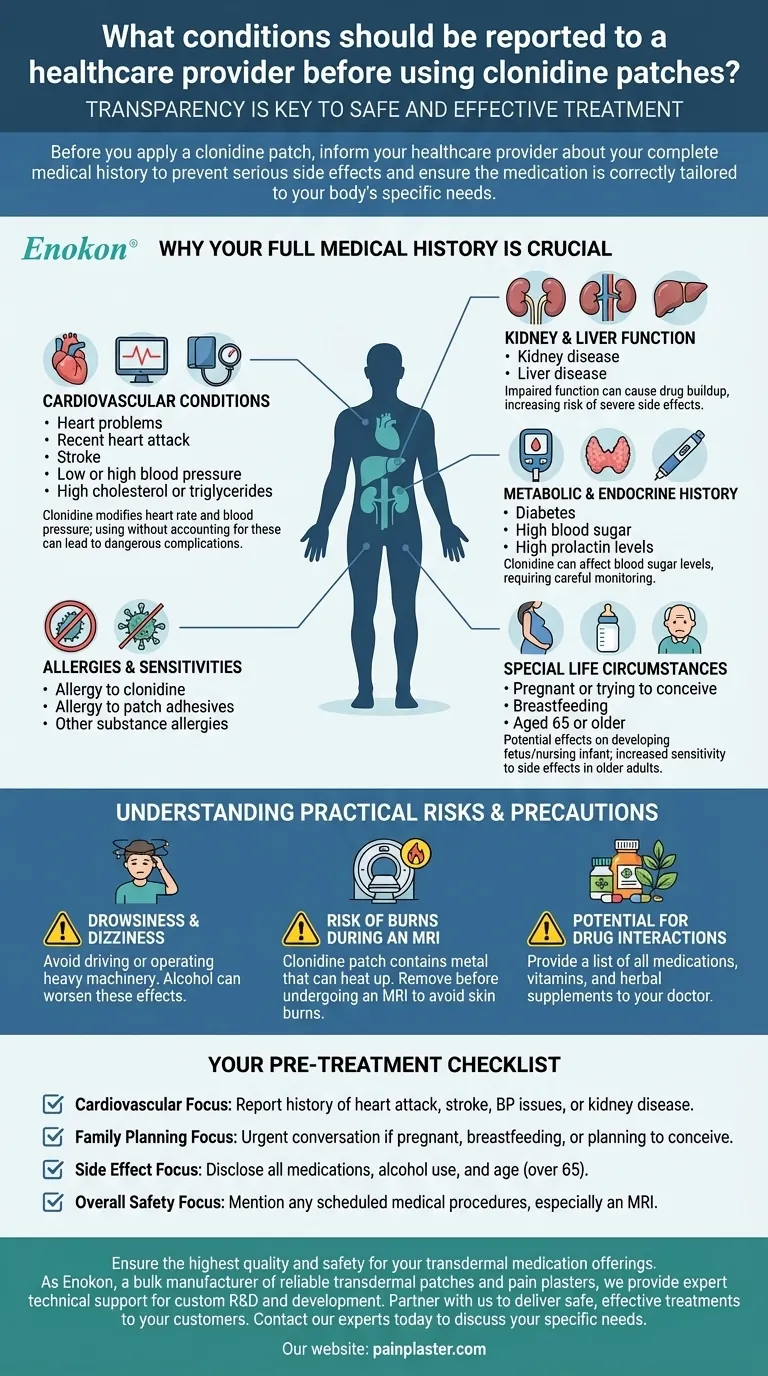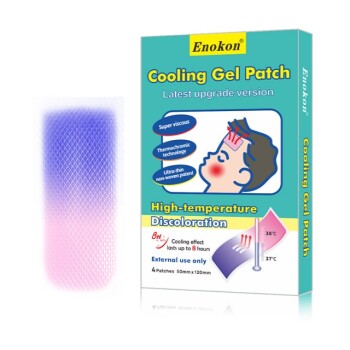Before you apply a clonidine patch, it is essential to inform your healthcare provider about your complete medical history. You must report any history of kidney or heart disease, previous stroke or heart attack, allergies to clonidine, and whether you are pregnant, planning to become pregnant, or breastfeeding. This transparency is the most critical step toward ensuring the medication is both safe and effective for you.
Clonidine is a potent medication that directly impacts your cardiovascular and central nervous systems. Providing your doctor with a comprehensive health profile is not just a formality—it is a crucial safety measure to prevent potentially serious side effects and ensure the treatment is correctly tailored to your body's specific needs.

Why Your Full Medical History is Crucial
Clonidine works by relaxing blood vessels and slowing the heart rate, which is why it can effectively manage conditions like high blood pressure. However, this same mechanism of action means that pre-existing health issues can significantly alter how your body responds to the drug.
Cardiovascular Conditions
Your doctor must know if you have a history of heart problems, a recent heart attack, stroke, or either low or high blood pressure. Clonidine directly modifies heart rate and blood pressure, and using it without accounting for these conditions can lead to dangerous complications. A history of high cholesterol or triglycerides is also relevant.
Kidney and Liver Function
Your kidneys and liver are responsible for processing and clearing medications from your system. If you have kidney or liver disease, your body may not be able to eliminate clonidine effectively. This can cause the drug to build up to unsafe levels, increasing the risk of severe side effects.
Metabolic and Endocrine History
Conditions like diabetes or high blood sugar (or a family history of them) should be reported. While less common, clonidine can affect blood sugar levels, requiring careful monitoring. Your doctor also needs to know about any history of high prolactin levels.
Allergies and Sensitivities
A known allergy to clonidine or any other substance, including the adhesives used in patches, is a primary reason the medication may not be suitable for you. This is the first thing your provider will need to rule out.
Special Life Circumstances
Your provider must be informed if you are pregnant, trying to conceive, or breastfeeding. The medication can potentially affect a developing fetus or a nursing infant. Additionally, patients aged 65 or older may be more sensitive to side effects like dizziness and drowsiness.
Understanding the Practical Risks and Precautions
Beyond your medical history, using a clonidine patch involves being aware of potential side effects and specific safety warnings that can affect your daily life.
Drowsiness and Dizziness
Clonidine can cause significant drowsiness or dizziness, impairing your ability to perform tasks that require mental alertness. You should avoid driving or operating heavy machinery until you know how the medication affects you. Alcohol can worsen these effects and should be avoided.
Risk of Burns During an MRI
This is a critical and often overlooked warning. The clonidine patch contains small amounts of metal that can heat up during a Magnetic Resonance Imaging (MRI) scan, leading to skin burns. You must inform your medical team and remove the patch before undergoing an MRI.
Potential for Drug Interactions
It is vital to provide your doctor with a list of all other medications you are taking. This includes prescriptions, over-the-counter drugs, vitamins, and herbal supplements. Other substances can interact with clonidine, altering its effectiveness or increasing the risk of adverse effects.
Your Pre-Treatment Checklist
To ensure your safety, use this checklist as a guide for the conversation with your healthcare provider before starting clonidine patches.
- If your primary focus is cardiovascular health: You must report any history of heart attack, stroke, blood pressure issues, or kidney disease to prevent dangerous complications.
- If your primary focus is family planning: An urgent conversation is needed if you are pregnant, breastfeeding, or planning to conceive to weigh the risks and benefits.
- If your primary focus is avoiding side effects: Disclose all other medications you take, your alcohol use, and your age (especially if over 65) to help your doctor mitigate risks like dizziness.
- If your primary focus is overall safety: Mention any scheduled medical procedures, especially an MRI, to avoid specific risks like skin burns from the patch.
Proactive and honest communication with your healthcare provider is the key to using clonidine safely and effectively.
Summary Table:
| Condition Category | Specific Conditions to Report |
|---|---|
| Cardiovascular | Heart disease, heart attack, stroke, high/low blood pressure |
| Organ Function | Kidney disease, liver disease |
| Metabolic/Endocrine | Diabetes, high blood sugar, high prolactin levels |
| Allergies | Allergy to clonidine or patch adhesives |
| Special Circumstances | Pregnancy, breastfeeding, age 65+, scheduled MRI |
Ensure the highest quality and safety for your transdermal medication offerings. As Enokon, a bulk manufacturer of reliable transdermal patches and pain plasters, we provide healthcare and pharma distributors and brands with expert technical support for custom R&D and development. Partner with us to deliver safe, effective treatments to your customers. Contact our experts today to discuss your specific needs.
Visual Guide

Related Products
- Asthma Cough and Pain Relief Patch for Adults and Kids
- Far Infrared Deep Heat Relief Patches Medicated Pain Relief Patches
- Herbal Eye Protection Patch Eye Patch
- Mugwort Wormwood Pain Relief Patch for Neck Pain
- Menthol Gel Pain Relief Patch
People Also Ask
- What role do natural ingredients and acupoint stimulation play in a cough relief patch? Synergistic Relief Explained
- What makes the cough relief patch a convenient option for managing coughs? A Mess-Free, On-the-Go Solution
- How does capsaicin work in the Reliever Patch? A Drug-Free Solution for Targeted Pain Relief
- How should missed doses of the Reliever Patch be handled? Safe Usage Guidelines
- How does the cough relief patch provide targeted relief? Direct, Soothing Comfort for Coughs & Chest Congestion














